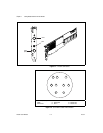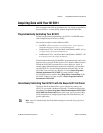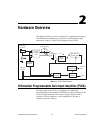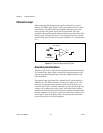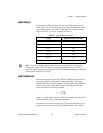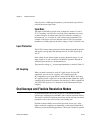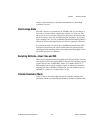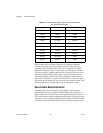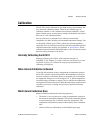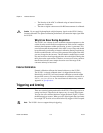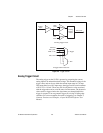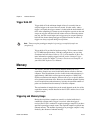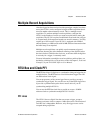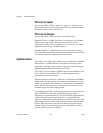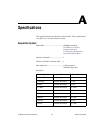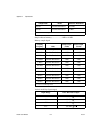
Chapter 2 Hardware Overview
© National Instruments Corporation 2-7 NI 5911 User Manual
Calibration
The NI 5911 can be calibrated for very high accuracy and resolution due
to an advanced calibration scheme. There are two different types of
calibration: internal, or self, calibration and external calibration. A third
option, internal restore, restores factory settings and should be used only in
the event of a self-calibration failure.
Internal calibration is performed via a software command that
compensates for drifts caused by environmental temperature changes. You
can internally calibrate your NI 5911 without any external equipment
connected. External calibration recalibrates the device when the specified
calibration interval has expired. See Appendix A, Specifications,forthe
calibration interval.External calibration requires youto connectan external
precision voltage reference to the device.
Internally Calibrating the NI 5911
Internally calibrate your NI 5911 with a software function or a
LabVIEW VI. See Chapter 3, Common Functions and Examples,ofyour
NI-SCOPE Software User Manual for step-by-step instructions for
calibrating your digitizer.
When Internal Calibration Is Needed
To provide the maximum accuracy independent of temperature changes,
the NI 5911 contains a heater that stabilizes the temperature of the most
sensitive circuitries on the board. However, the heater can accommodate
for temperature changes over a fixed range of ±5 °C. When temperatures
exceed this range, the heater no longer is able to stabilize the temperature,
and signal data becomes inaccurate. When the temperature range has been
exceeded, you receive a warning, and you need to perform an internal
calibration.
What Internal Calibration Does
Internal calibration performs the following operations:
• The heater is set to regulate over a range of temperatures centered at
the current environmental temperature.The circuitcomponents require
a certain amount of time to stabilize at the new temperature. This
temperature stabilization accounts for the majority of the calibration
time.
• Gain and offset are calibrated for each individual input range.



